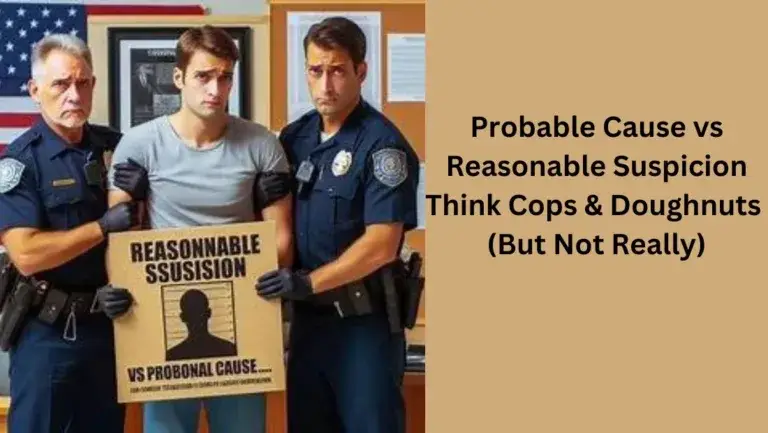Imagine a delicious doughnut shop. You walk in, craving a sugary treat. Suddenly, a cop with a serious case of the munchies approaches, eyeing your doughnut with suspicion. Busted! Wait, what? Hold on there, officer! This isn’t a crime scene, it’s a bakery bonanza! This, my friends, is the difference between reasonable suspicion and probable cause in a nutshell. ( probable cause vs reasonable suspicion )

The cop might suspect you have a serious doughnut addiction (hey, no judgement!), but that’s not enough to arrest you. That’s reasonable suspicion. Probable cause, on the other hand, is like catching you red-handed, sprinkles and all, shoving that doughnut in your pocket – a much stronger case for a sugar-induced arrest.
Table of Contents
ToggleThe Cop’s Toolkit: Reasonable Suspicion vs Probable Cause
Think of reasonable suspicion and probable cause as tools in a cop’s metaphorical toolbox. Each one serves a purpose, and using the right tool for the job is crucial.
Reasonable Suspicion: Imagine a flashlight beam cutting through the darkness. Reasonable suspicion is like that – a hunch, a hint of something fishy, but not enough for a slam-dunk arrest. It allows officers to investigate further, like asking you a few questions about your doughnut-related activities.
Probable Cause: Think flashing police lights and sirens. Probable cause is the big gun, the evidence that screams “crime scene!” It’s when the cop has enough info to believe you committed a crime, like witnessing you stuffing that doughnut down your shirt with frosting dripping down your chin (we’ve all been there). This is when the cuffs come out.
Beyond Doughnuts: Real-World Reasonable Suspicion and Probable Cause
Okay, enough about pastries (for now). Here are some real-world examples to differentiate these legal concepts:
Reasonable Suspicion:
- A cop sees someone walking down a street known for drug activity, acting jittery and constantly looking over their shoulder.
- Someone trips a security alarm entering a jewelry store, then casually strolls out empty-handed.
- You’re leaving a bank with a suspiciously large amount of cash, and let’s be honest, an even more suspicious craving for doughnuts (coincidence?).
Probable Cause:
- A witness sees someone break a window and climb into a house.
- An officer pulls you over for speeding and smells a strong odor of marijuana coming from the car.
- You confess to your friend (who happens to be an undercover cop) about robbing a bank (doughnut fund, anyone?).
The Balancing Act: Protecting Rights & Maintaining Safety
The whole reasonable suspicion vs. probable cause thing is a delicate dance. Law enforcement needs the authority to investigate potential crimes, but our rights need protection too. Reasonable suspicion allows for investigation without violating our freedom, while probable cause ensures there’s enough evidence for a potential arrest.
People Also Loved To Read;
What is a Bench Warrant and How is it Different from an Arrest Warrant?
Emergency Custody Order: When Seconds Count in Protecting Your Child
Beyond the Basics: Digging Deeper
We’ve covered the basics, but the legal world is a fascinating labyrinth. Here are some additional points to ponder:
- The Totality of the Circumstances: Probable cause isn’t a single, magical piece of evidence. It’s a combination of factors that, when viewed together, paint a clear picture of criminal activity. Imagine a mosaic – each little tile might not mean much on its own, but put them all together, and you get a complete image.
- The Warrant Wobble: Remember, probable cause is often a prerequisite for obtaining a warrant, a legal document authorizing a search or arrest. But there are exceptions! For instance, probable cause might justify a warrantless arrest if a crime is happening right in front of an officer’s eyes (think catching someone red-handed with those doughnuts).
Reasonable Suspicion vs. Probable Cause in Action: Case Studies
Let’s take a step outside the doughnut shop and delve into real-life scenarios to see reasonable suspicion and probable cause in action:
Case Study #1: The Jittery Jaywalker
The Situation: A police officer patrols a high-crime area. They spot Jay, a young man, walking erratically and looking around nervously.
Reasonable Suspicion: The officer might approach Jay and
ask him a few questions to see if anything suspicious is going on. This is reasonable suspicion – a hunch based on Jay’s behavior, but not enough for an arrest.
Probable Cause: If, during questioning, Jay stutters and admits he just bought drugs from a nearby alleyway, that would be probable cause. The officer now has enough evidence (Jay’s confession) to believe a crime has been committed.
Case Study #2: The Chatty Cathy
The Situation: Cathy enters a bank and withdraws a large sum of cash. As she exits, she bumps into a security guard who notices Cathy seems jumpy and avoids eye contact.
Reasonable Suspicion: The guard might ask Cathy a few questions about her withdrawal and her destination. This is reasonable suspicion – the guard’s curiosity piqued by Cathy’s behavior.
Probable Cause: Now, let’s say Cathy starts rambling about needing the money for a “secret operation” and mentions a hidden weapon in her purse. Bingo! Probable cause. Cathy’s bizarre statements combined with the large cash withdrawal raise enough suspicion for the guard to detain her until the police arrive.
Knowing Your Rights: When to Lawyer Up
If you ever find yourself caught in the crosshairs of reasonable suspicion or probable cause, here are some crucial tips:
- Stay Calm: Don’t panic! Take a deep breath and remain polite and cooperative.
- Know Your Rights: You have the right to remain silent and the right to an attorney. If you’re unsure about your rights, politely ask the officer to explain them.
- Don’t Consent to Searches (Unless Comfortable): You generally have the right to refuse a search without a warrant. However, if you feel comfortable consenting, you absolutely can.
- If Arrested, Don’t Resist: Resisting arrest can lead to additional charges.
- Contact an Attorney: If you’re arrested, your best course of action is to contact a lawyer as soon as possible.
The Bottom Line: Doughnut Deprivation Avoided!
Understanding reasonable suspicion and probable cause empowers you to navigate police interactions with confidence. Remember, reasonable suspicion allows for questioning and investigation, while probable cause is the threshold for an arrest. By knowing your rights and staying calm, you can ensure a smooth (and hopefully doughnut-filled) interaction with the authorities.
Further Exploration: Resources for the Curious Mind
For those who crave more legal knowledge, here are some resources to explore:
- The Fourth Amendment to the U.S. Constitution: https://www.law.cornell.edu/constitution/fourth_amendment – This is the foundation for search and seizure laws in the United States.
- The American Civil Liberties Union (ACLU): https://www.aclu.org/ – The ACLU provides resources and information on your rights when interacting with law enforcement.
- The National Association of Criminal Defense Lawyers (NACDL): https://www.nacdl.org/ – The NACDL can connect you with a qualified criminal defense attorney in your area.
Probable Cause vs Reasonable Suspicion: Understanding the Levels of Evidence
1. Answer: Law enforcement interactions often hinge on the distinction between probable cause vs reasonable suspicion. Probable cause is a higher standard needed for arrests and search warrants, while reasonable suspicion justifies brief detentions like Terry stops.
Question: During a traffic stop, how does an officer determine the difference between probable cause vs reasonable suspicion?
2. Answer: Probable cause vs reasonable suspicion can be confusing. Imagine a spectrum: reasonable suspicion is a hunch, while probable cause is a strong likelihood that a crime has been committed.
Question: Can you give an example that clarifies the difference between probable cause vs reasonable suspicion using a scenario?
3. Answer: Let’s say an officer sees someone running from a jewelry store with a smashed window. This would likely establish probable cause for arrest, as it suggests a crime (robbery) and the person’s involvement.
Question: In the previous scenario, if the officer only saw someone leaving the jewelry store quickly, not running, would that be enough for probable cause or just reasonable suspicion?
4. Answer: Reasonable suspicion might allow the officer to briefly detain the person from the jewelry store (Terry stop) for questioning, but it wouldn’t be enough for an arrest without further evidence.
5. Answer: When considering probable cause vs reasonable suspicion, the key is for the officer to have specific and articulable facts to support their belief that a crime is happening or has happened.
Question: How does the requirement of “specific and articulable facts” play a role in determining probable cause vs reasonable suspicion?
6. Answer: Probable cause vs reasonable suspicion protects citizens from unreasonable searches and seizures. Only with probable cause can an officer search your person or belongings without a warrant.
Question: In the context of probable cause vs reasonable suspicion, how do these standards protect people’s rights?
7. Answer: If you believe an officer acted without probable cause, you may have grounds to challenge a search or arrest. Consulting with a lawyer is crucial in such situations.
Question: When considering probable cause vs reasonable suspicion, what legal recourse might someone have if they believe their rights were violated?
8. Answer: Understanding probable cause vs reasonable suspicion is important not just for law enforcement but also for citizens who want to know their rights during police interactions.
Question: Why is it important for both law enforcement and citizens to understand the distinction between probable cause vs reasonable suspicion?
9. Answer:Probable cause vs reasonable suspicion are legal terms, but the concepts translate to everyday life. We assess situations based on evidence, and the level of evidence determines how strongly we suspect something.
Question: Can you give a real-world example (outside of law enforcement) that illustrates the concept of probable cause vs reasonable suspicion?
10. Answer: Courts play a crucial role in evaluating probable cause vs reasonable suspicion when reviewing police actions. They determine if the officer had sufficient justification for their actions.
